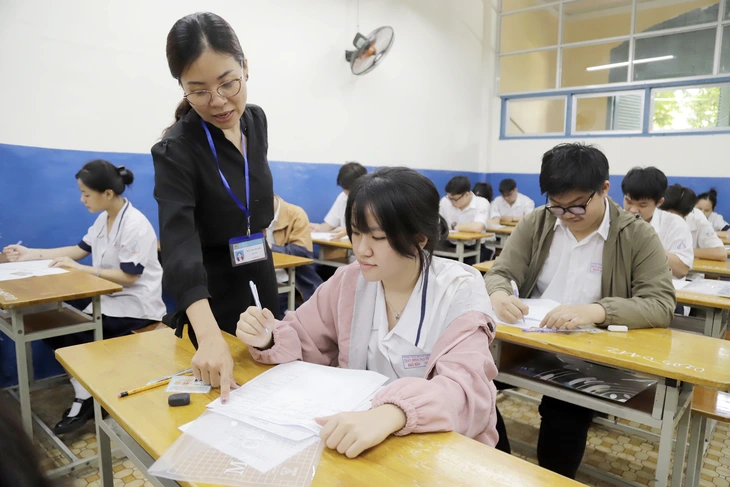
12th grade students of Tran Khai Nguyen High School, District 5, Ho Chi Minh City during the 2025 high school graduation mock exam - Photo: NHU HUNG
Tuoi Tre records experts' opinions on this issue.
* Dr. SAI CONG HONG (former deputy director of the Department of Quality Management - Ministry of Education and Training):
Identify specialized competencies
Changing the university admission combination cannot be an arbitrary decision but needs to be announced early so that students and parents have direction to prepare for the entire high school study process.
To ensure the quality of input and avoid the current situation of "puzzling" candidates, universities need to clarify what basic, fundamental and specialized abilities each major requires so that students can successfully study that major at university level. From there, determine the combination of subjects or exams for admission in a scientific and reasonable manner.
Any changes in the admissions process must be based on thorough research and evaluation, with clear scientific basis, rather than just an immediate decision. Therefore, it is time for the management agency to issue detailed and specific regulations on this issue.
That not only helps universities have a roadmap and basis to adjust their admission combinations, but also puts an end to the awkward situation that causes confusion and disadvantages for candidates, contributing to creating a fairer and more transparent exam and admission process.
* Prof. Dr. TRAN THIEN PHUC (Vice Principal of University of Technology - Ho Chi Minh City National University):
Comprehensive admission
In admission, there are two important factors for universities: recruiting enough and recruiting correctly. In fact, all schools now want to recruit enough. Meanwhile, the University of Technology considers the factor of recruiting correctly important, so it decided to choose the comprehensive admission method.
In 2025, the University of Technology will continue to implement and strengthen the selection process based on the synthesis of many criteria that has been applied quite effectively in the past three years. With the synthesis selection process, candidates are evaluated by combining the elements and corresponding weights used for selection.
Specifically, the academic criteria (90%) includes three components: high school study scores (six semesters corresponding to the admission registration combination); high school graduation exam scores (subjects in the admission combination); and test scores assessing capacity and social activities, literature, sports and fine arts.
The comprehensive admission process aims to improve the quality of input and comprehensively assess candidates' abilities, while creating fairness for all candidates because all recruitment sources are put into the same admission method. This method helps reduce dependence on a single exam. This is also a modern admission trend applied by many leading universities in the world .
In the first year of admission using this method, the school received 8,500 applications, but in 2024, this number nearly doubled. Through reviewing the academic results of students admitted to the school, it was found that those admitted using the comprehensive admission method had better academic results. The comprehensive admission method has recruited the right candidates with the ability to study at the university level.
* Associate Professor, Dr. VUONG THI NGOC LAN (Vice Principal of Ho Chi Minh City University of Medicine and Pharmacy):
Don't rely solely on test scores.
It is time for university admissions to be reformed in line with the new generaleducation program and the development of society. In particular, universities training in health sciences need more effective and reasonable admissions methods to ensure fairness, selecting people with capacity, ethics and suitability for the profession.
The most effective way to recruit medical students is to combine academic assessment, personal qualities and specialized abilities instead of relying solely on exam scores as is currently the case. High school graduation exam scores should only be a necessary condition (with regulations on floor scores). This innovation needs a specific roadmap, needs to be piloted and gradually adjusted before being widely replicated.
Accordingly, medical schools need to gradually shift to an admission model that combines entrance exams and selection. In which, entrance exams (in-depth tests of math, chemistry, biology and an additional test of logic ability, ethical awareness); personal profile review (high school academic achievements, recommendation letters, career essays, volunteer activities). A separate exam for the medical sector, combining a test of logic thinking and professional ethics will more accurately reflect the candidate's ability.
It is especially important to include the interview format that is already popular in medical schools in developed countries. In the US, medical university admissions are based on interviews, not just on the score of an exam. The multi-station interview (MMI) model can help assess communication skills, situation handling, and professional attitude. These are factors that are not reflected in multiple-choice tests. The interview score accounts for a certain proportion (for example, 20%).
In addition, the medical industry also needs to focus on recruiting students according to the model of "early training - clear orientation". In reality, many students enter the medical industry based on their family's wishes, without understanding or passion for the profession. Therefore, it is necessary to screen candidates for physical health, psychology and career motivation for students who want to pursue a medical career.

Candidates learn information at the 2025 Admissions Consulting Day organized by Tuoi Tre newspaper - Photo: THANH HIEP
* MSc. CU XUAN TIEN (Head of Admissions and Student Affairs Department, University of Economics and Law, Ho Chi Minh City National University):
Towards merit-based admissions
Currently, some experts have proposed to increase the number of subjects in the university entrance exam to 4-6 subjects instead of the current three subjects. In my opinion, this is not appropriate. First, studying to pass the high school graduation exam will be very different from studying to pass the university entrance exam.
Studying for university entrance exam requires candidates to concentrate and make a lot of effort during their studies, only then will they have a chance to be admitted to the university of their dreams. Therefore, studying more subjects than the three subjects in the current combination will increase the pressure on students, they will lose a lot of time and effort.
Second, the current high school exam regulations only allow students to take four subjects (two compulsory subjects of mathematics and literature and two other elective subjects), so increasing the number of subjects in the combination beyond four is not feasible.
Personally, I still support universities to consider admission through exams such as ability assessment and thinking assessment. Because these exams will not focus on individual subjects such as physics, chemistry, biology, history, geography... instead, they will be practical exams in the fields of science, technology, society, economics, law...
Students must use the knowledge they have learned in high school combined with their analytical skills and scientific thinking skills to do the test. In the case of specific majors, candidates may be required to consider their high school grades in specific subjects (threshold to ensure input quality).
* MSc. PHAM THAI SON (Director of Admissions and Communications Center, Ho Chi Minh City University of Industry and Trade):
Increase flexibility, expand admission combinations
In the context of the 2018 General Education Program, there have been many changes requiring admissions to be adjusted to be more suitable.
The new program focuses on developing students’ comprehensive abilities, allowing them to choose subjects according to their career orientation, so schools should diversify their admission combinations instead of keeping the old exam blocks. Diversifying admission subject combinations can help universities recruit students who meet the requirements of their majors.
Universities need to be more flexible in their admission methods. In addition to using new combinations, it is necessary to strengthen the admission method based on the actual abilities of candidates through ability assessments instead of relying solely on high school graduation exam scores.
Source: https://tuoitre.vn/tuyen-sinh-dai-hoc-theo-khoi-co-con-phu-hop-20250610082017981.htm
















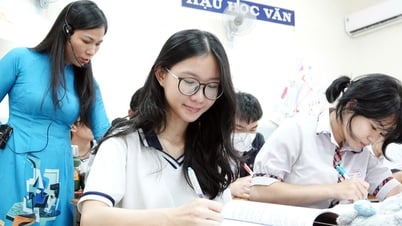
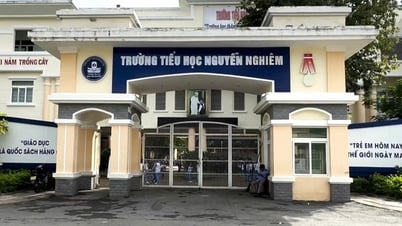





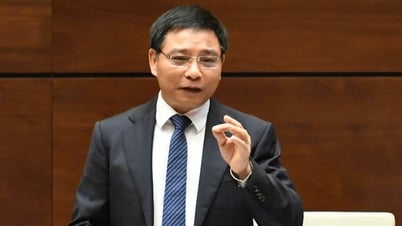















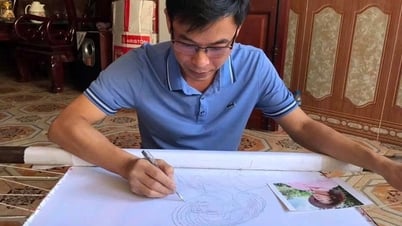



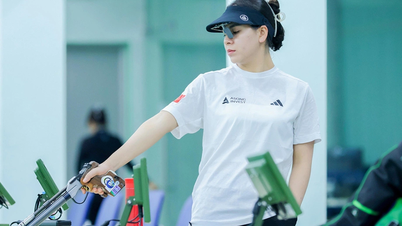











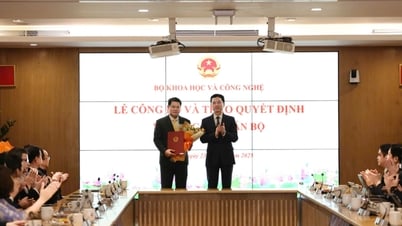






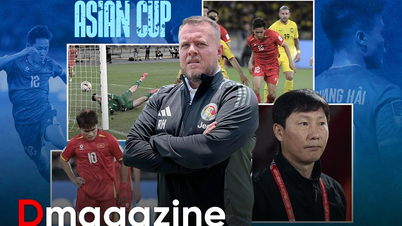















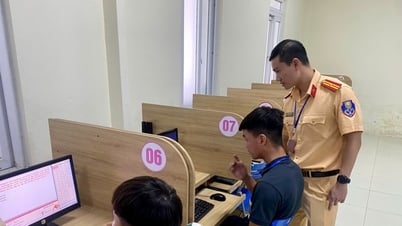




















Comment (0)